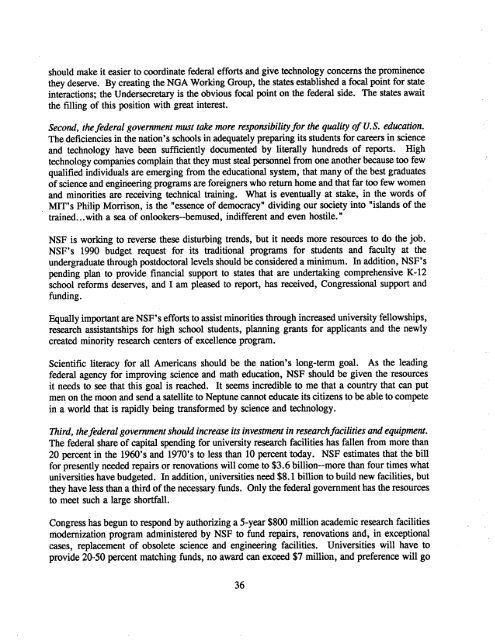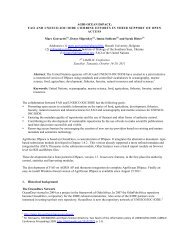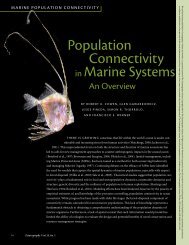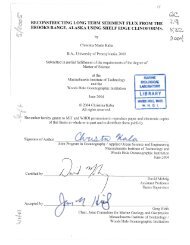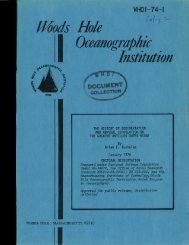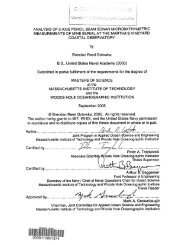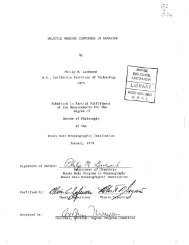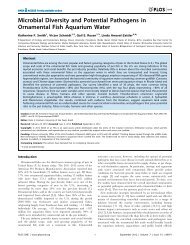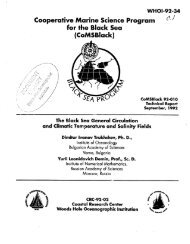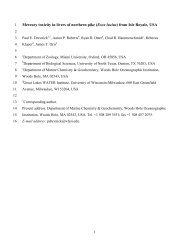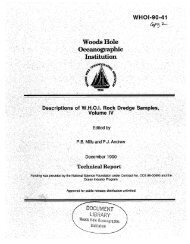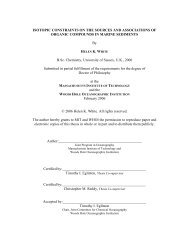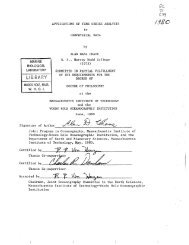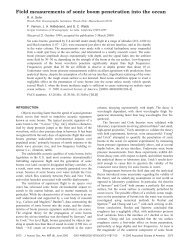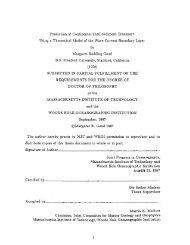WHOI-90-52
WHOI-90-52
WHOI-90-52
You also want an ePaper? Increase the reach of your titles
YUMPU automatically turns print PDFs into web optimized ePapers that Google loves.
should make it easier to coordinate federal efforts and give tehnology concerns the prominence<br />
they deserve. By creating the NGA Working Group, the states established a focal point for state<br />
interactions; the Undersereta is the obvious foc point on the federal side. The states await<br />
the fillng of this position with great interest.<br />
Second, the federal governnt must tak more responsibilty for the quality of U. S. education.<br />
The deficiencies in the nation's schools in adequately preparng its students for caeers in science<br />
and technology have been sufficiently documente by literaly hundreds of reports. High<br />
technology companies complain that they must stea personnel from one another because too few<br />
qualified individuals are emerging from the educational system, that many of the best graduates<br />
of science and engineering programs are foreigners who return home and that far to few women<br />
and minorities are receiving tehnica training. What is eventualy at stae, in the words of<br />
MIT's Philp Morrson, is the "essence of democracy" dividing our soiety into "islands of the<br />
trained... with a se of onlookers--bemuse, indifferent and even hostile. "<br />
NSF is working to reverse these disturbing trends, but it nees more resources to do the job.<br />
NSF's 19<strong>90</strong> budget request for its traditional programs for students and faculty at the<br />
undergraduate through postdoctoral<br />
levels should be considered a minimum. In addition, NSF's<br />
pending plan to provide financial support to states that are undertng comprehensive K-12<br />
school reforms deserves, and I am please to report, has recived, Congressional support and<br />
funding.<br />
Equally importt are NSF's efforts to assist minorities through increase university fellowships,<br />
resech assistatships for high school students, planning grats for applicants and the newly<br />
created minority resech centers of excellence program.<br />
Scientific literacy for all Americas should be the nation's long-term goal. As the leading<br />
federal agency for improving science and math education, NSF should be given the resources<br />
it nees to se that this goal is reached. It seems incredible to me that a countr that ca put<br />
men on the moon and send a satellte to Neptune canot educate its citizens to be able to compete<br />
in a world that is rapidly being transformed by science and tehnology.<br />
Third, thefederal governnt should increase its investmnt in researchfacUities and equipment.<br />
The federal share of capita spending for university resech facilties has fallen from more than<br />
20 percent in the 1960's and 1970's to less than 10 percent today. NSF estimates that the bil<br />
for presently neeed repairs or renovations wil come to $3.6 bilion--more than four times what<br />
universities have budgeted. In addition, universities nee $8.1 bilion to build new facilities, but<br />
they have less than a third of the necessa funds. Only the federal government has the resources<br />
to meet such a large shortfalL.<br />
Congress has begun to respond by authorizing a 5-yea $800 milion academic resech facilties<br />
modernization program administered by NSF to fund repairs, renovations and, in exceptional<br />
cases, replacement of obsolete science and engineering facilties. Universities wil have to<br />
provide 20-50 percent matching funds, no award ca exce $7 milion, and preference wil go<br />
36


